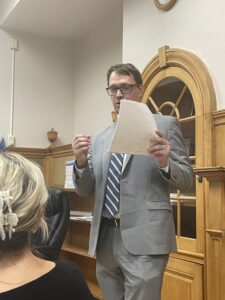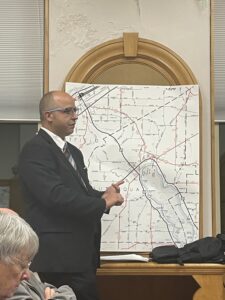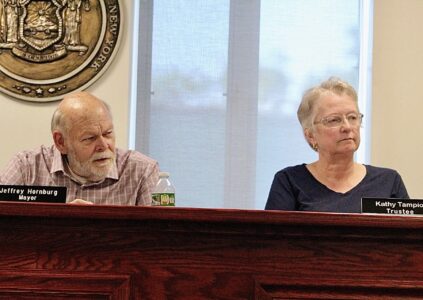No decision on Dewittville Golf Course proposal
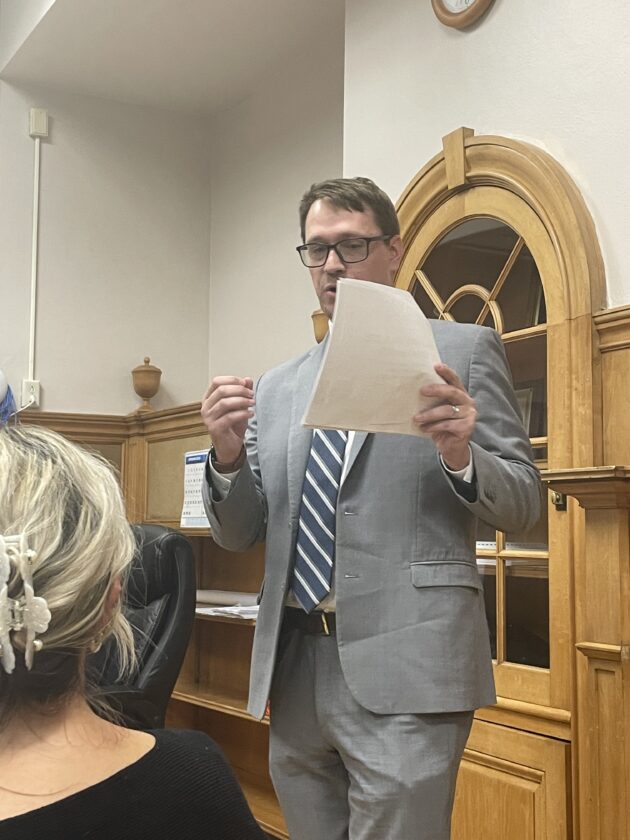
Attorney Stephen Daly with Citizen Environmental Law, PLLC, submitted a number of objections to the proposed development at the former Point Chautauqua Golf Course on behalf of his clients Chautauqua Protest.
- Attorney Stephen Daly with Citizen Environmental Law, PLLC, submitted a number of objections to the proposed development at the former Point Chautauqua Golf Course on behalf of his clients Chautauqua Protest.
- By GREGORY BACON gbacon@observertoday.com DEWITTVILLE – New and repeated objections are being raised regarding the proposed housing and commercial development at the former Point Chautauqua Golf Course. Wednesday morning attorney Stephen Daly, founder and managing attorney with Citizen Environmental Law PLLC in Rochester, submitted a multi-page document of concerns with the Planned Unit Development proposed by Ellicott Development called Sunset View. Daly said he has been hired by an organization called “Chautauqua Protest,” made up of select neighbors near the proposed development. He did not identify any of his clients or specify where they live. The former golf course is surrounded by three associations – Chautauqua Lake Estates, Point Chautauqua Neighborhood, and the Villas at Chautauqua Point. In September, the Chautauqua town Zoning Board of Appeals recommended Elliott Development receive a Special Use Permit to move forward with the $70 million project, which would have single family homes, town homes, condominiums, and a restaurant/tap house. The overall development would be managed by a Home Owners Association. At the Chautauqua Town Board meeting Wednesday evening, Supervisor Don Emhardt acknowledged receiving “a bunch of legal papers” from Daly and said they would not be voting on the proposed Special Use Permit for Sunset View. See GOLF, Page A2 GOLF They would still, though, have the public hearing. Attorney Sean Hopkins representing Ellicott Development gave a short presentation about Sunset View, most of which had been shared previously. He did note during his presentation that Point Chautauqua Association wants to see Ellicott Development reduce the number of single family lots from 32 to 23. In response, Ellicott Development is willing to reduce the number of single family lots on Lookout Avenue from 11 to six, however they will only agree to do so if Point Chautauqua Association waives its right for any future litigation. Hopkins said the proposal is fairly recent and they have not yet heard from Calimeri if his clients are satisfied with that offer. Following Hopkins’ presentation, Daly spoke on behalf of Chautauqua Protest. He began criticizing Ellicott Development’s project in Angola called Grandview Bay. Daly alleged that Grandview Bay has struggled to sell the eight townhomes, continues to slash the prices, and have had to rent them out as short-term rentals through Airbnb. Daly called the project a “ghost town,” saying the development “stuck out like a sore thumb.” At one point during his presentation Chautauqua Town Attorney Joel Seachrist asked Daly how many of the eight town homes were not sold, to which he replied “at least two.” Seachrist noted Daly referred to the development “as a ghost town” to which Seachrist said “that seems a bit premature.” Daly continued with his presentation, questioning how long construction will take. “What we know is the project will take a minimum of three years but we don’t know what the end date will be. It could be three years to never or forever. We don’t know how long construction is going to go on,” he said. Daly also questioned if the project is meeting town code requirements for Planned Unit Developments. He argued that the single family home section should be considered a subdivision and not a PUD. Daly also argued that the lot sizes are too small for PUDs and that there are too many units proposed in the entire development area compared to what the developer wants. “The applicant is proposing 174 units. That is at least 20 units too many if you just do the math, according to what the town code says,” he said. Daly also voiced objections with regard to the size of individual units, the lack of lakefront property, and how the public hearing was taking place before the State Environmental Quality Review was completed. After Daly spoke, Calimeri noted that he has similar concerns. He questioned the number of units proposed for the entire project, how the town board has yet to adopt its updated Comprehensive Plan, the number of boat docks proposed, and if studies have been completed regarding the impact of the development on the county’s sewer plants. Calimeri urged more studies before making a vote. “We want the law to be applied,” he said. Following the public hearing, which also included further objections from neighbors, the town board voted to have a Waterfront Consistency Statement be reviewed by the town Zoning Board of Appeals. Emhardt said that statement will be used when reviewing the dock proposed for the project. At the end of the meeting, the town board called for an executive session where it met with its attorney to discuss “potential litigation issues.”
Wednesday morning attorney Stephen Daly, founder and managing attorney with Citizen Environmental Law PLLC in Rochester, submitted a multi-page document of concerns with the Planned Unit Development proposed by Ellicott Development called Sunset View. Daly said he has been hired by an organization called “Chautauqua Protest,” made up of select neighbors near the proposed development.
He did not identify any of his clients or specify where they live. The former golf course is surrounded by three associations – Chautauqua Lake Estates, Point Chautauqua Neighborhood, and the Villas at Chautauqua Point.
In September, the Chautauqua town Zoning Board of Appeals recommended Elliott Development receive a Special Use Permit to move forward with the $70 million project, which would have single family homes, town homes, condominiums, and a restaurant/tap house. The overall development would be managed by a Home Owners Association.
At the Chautauqua Town Board meeting Wednesday evening, Supervisor Don Emhardt acknowledged receiving “a bunch of legal papers” from Daly and said they would not be voting on the proposed Special Use Permit for Sunset View.
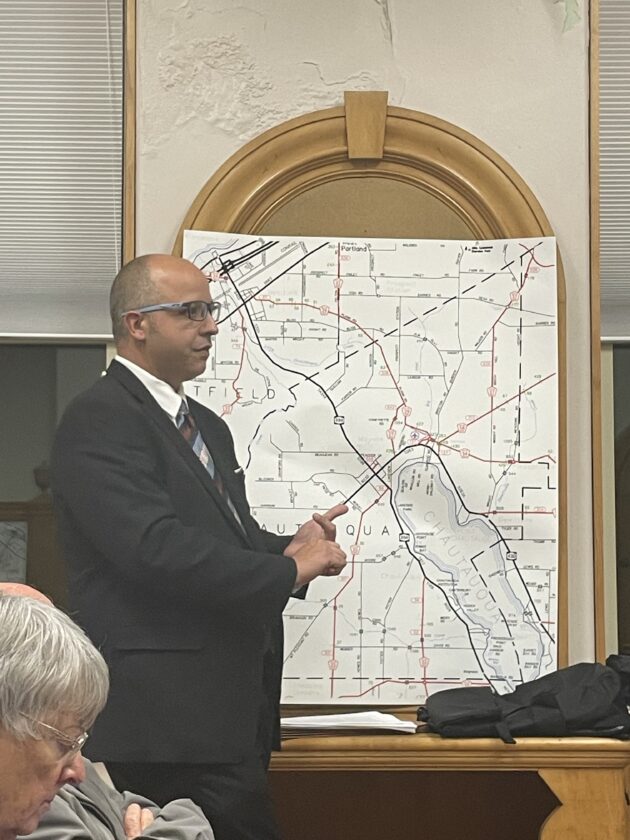
By GREGORY BACON gbacon@observertoday.com DEWITTVILLE – New and repeated objections are being raised regarding the proposed housing and commercial development at the former Point Chautauqua Golf Course. Wednesday morning attorney Stephen Daly, founder and managing attorney with Citizen Environmental Law PLLC in Rochester, submitted a multi-page document of concerns with the Planned Unit Development proposed by Ellicott Development called Sunset View. Daly said he has been hired by an organization called “Chautauqua Protest,” made up of select neighbors near the proposed development. He did not identify any of his clients or specify where they live. The former golf course is surrounded by three associations – Chautauqua Lake Estates, Point Chautauqua Neighborhood, and the Villas at Chautauqua Point. In September, the Chautauqua town Zoning Board of Appeals recommended Elliott Development receive a Special Use Permit to move forward with the $70 million project, which would have single family homes, town homes, condominiums, and a restaurant/tap house. The overall development would be managed by a Home Owners Association. At the Chautauqua Town Board meeting Wednesday evening, Supervisor Don Emhardt acknowledged receiving “a bunch of legal papers” from Daly and said they would not be voting on the proposed Special Use Permit for Sunset View. See GOLF, Page A2 GOLF They would still, though, have the public hearing. Attorney Sean Hopkins representing Ellicott Development gave a short presentation about Sunset View, most of which had been shared previously. He did note during his presentation that Point Chautauqua Association wants to see Ellicott Development reduce the number of single family lots from 32 to 23. In response, Ellicott Development is willing to reduce the number of single family lots on Lookout Avenue from 11 to six, however they will only agree to do so if Point Chautauqua Association waives its right for any future litigation. Hopkins said the proposal is fairly recent and they have not yet heard from Calimeri if his clients are satisfied with that offer. Following Hopkins’ presentation, Daly spoke on behalf of Chautauqua Protest. He began criticizing Ellicott Development’s project in Angola called Grandview Bay. Daly alleged that Grandview Bay has struggled to sell the eight townhomes, continues to slash the prices, and have had to rent them out as short-term rentals through Airbnb. Daly called the project a “ghost town,” saying the development “stuck out like a sore thumb.” At one point during his presentation Chautauqua Town Attorney Joel Seachrist asked Daly how many of the eight town homes were not sold, to which he replied “at least two.” Seachrist noted Daly referred to the development “as a ghost town” to which Seachrist said “that seems a bit premature.” Daly continued with his presentation, questioning how long construction will take. “What we know is the project will take a minimum of three years but we don’t know what the end date will be. It could be three years to never or forever. We don’t know how long construction is going to go on,” he said. Daly also questioned if the project is meeting town code requirements for Planned Unit Developments. He argued that the single family home section should be considered a subdivision and not a PUD. Daly also argued that the lot sizes are too small for PUDs and that there are too many units proposed in the entire development area compared to what the developer wants. “The applicant is proposing 174 units. That is at least 20 units too many if you just do the math, according to what the town code says,” he said. Daly also voiced objections with regard to the size of individual units, the lack of lakefront property, and how the public hearing was taking place before the State Environmental Quality Review was completed. After Daly spoke, Calimeri noted that he has similar concerns. He questioned the number of units proposed for the entire project, how the town board has yet to adopt its updated Comprehensive Plan, the number of boat docks proposed, and if studies have been completed regarding the impact of the development on the county’s sewer plants. Calimeri urged more studies before making a vote. “We want the law to be applied,” he said. Following the public hearing, which also included further objections from neighbors, the town board voted to have a Waterfront Consistency Statement be reviewed by the town Zoning Board of Appeals. Emhardt said that statement will be used when reviewing the dock proposed for the project. At the end of the meeting, the town board called for an executive session where it met with its attorney to discuss “potential litigation issues.”
They would still, though, have the public hearing.
Attorney Sean Hopkins representing Ellicott Development gave a short presentation about Sunset View, most of which had been shared previously.
He did note during his presentation that Point Chautauqua Association wants to see Ellicott Development reduce the number of single family lots from 32 to 23. In response, Ellicott Development is willing to reduce the number of single family lots on Lookout Avenue from 11 to six, however they will only agree to do so if Point Chautauqua Association waives its right for any future litigation.
Hopkins said the proposal is fairly recent and they have not yet heard from Calimeri if his clients are satisfied with that offer.
Following Hopkins’ presentation, Daly spoke on behalf of Chautauqua Protest.
He began criticizing Ellicott Development’s project in Angola called Grandview Bay.
Daly alleged that Grandview Bay has struggled to sell the eight townhomes, continues to slash the prices, and have had to rent them out as short-term rentals through Airbnb.
Daly called the project a “ghost town,” saying the development “stuck out like a sore thumb.”
At one point during his presentation Chautauqua Town Attorney Joel Seachrist asked Daly how many of the eight town homes were not sold, to which he replied “at least two.”
Seachrist noted Daly referred to the development “as a ghost town” to which Seachrist said “that seems a bit premature.”
Daly continued with his presentation, questioning how long construction will take. “What we know is the project will take a minimum of three years but we don’t know what the end date will be. It could be three years to never or forever. We don’t know how long construction is going to go on,” he said.
Daly also questioned if the project is meeting town code requirements for Planned Unit Developments.
He argued that the single family home section should be considered a subdivision and not a PUD.
Daly also argued that the lot sizes are too small for PUDs and that there are too many units proposed in the entire development area compared to what the developer wants. “The applicant is proposing 174 units. That is at least 20 units too many if you just do the math, according to what the town code says,” he said.
Daly also voiced objections with regard to the size of individual units, the lack of lakefront property, and how the public hearing was taking place before the State Environmental Quality Review was completed.
After Daly spoke, Calimeri noted that he has similar concerns.
He questioned the number of units proposed for the entire project, how the town board has yet to adopt its updated Comprehensive Plan, the number of boat docks proposed, and if studies have been completed regarding the impact of the development on the county’s sewer plants.
Calimeri urged more studies before making a vote. “We want the law to be applied,” he said.
Following the public hearing, which also included further objections from neighbors, the town board voted to have a Waterfront Consistency Statement be reviewed by the town Zoning Board of Appeals. Emhardt said that statement will be used when reviewing the dock proposed for the project.
At the end of the meeting, the town board called for an executive session where it met with its attorney to discuss “potential litigation issues.”

